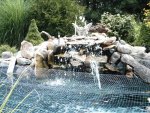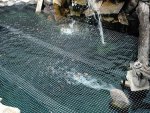digginponds
pondaholic
Which we all know thrive in oxygen-deprived water.
If I may suggest a few easy tips to keep this from happening to you and helps keep your water cooler.
Simple moving water stays cooler, much like my MO as to keep my water moving during the winter, to reduce water from freezing.
Fountain pumps are relatively cheap, and easy to install.
The 1st picture shows one of my fountain pumps shooting water just 6 feet into the air, thus as the water falls it cools.
In the 2[sup]nd[/sup] picture another pump shoots water directly across the pond.
Again my MO water moving is best for your fish and water quality.
If I may suggest a few easy tips to keep this from happening to you and helps keep your water cooler.
Simple moving water stays cooler, much like my MO as to keep my water moving during the winter, to reduce water from freezing.
Fountain pumps are relatively cheap, and easy to install.
The 1st picture shows one of my fountain pumps shooting water just 6 feet into the air, thus as the water falls it cools.
In the 2[sup]nd[/sup] picture another pump shoots water directly across the pond.
Again my MO water moving is best for your fish and water quality.



